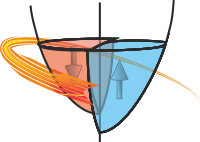#!/usr/bin/env python3
# -*- coding: utf-8 -*-
""":py:class:`lmfit.Model` model classes and functions for various generic models."""
# pylint: disable=invalid-name
__all__ = [
"Linear",
"Lorentzian_diff",
"Model",
"PowerLaw",
"Quadratic",
"StretchedExp",
"linear",
"lorentzian_diff",
"powerLaw",
"quadratic",
"stretchedExp",
]
import numpy as np
from lmfit import Model
from lmfit.models import LinearModel as _Linear # NOQA pylint: disable=unused-import
from lmfit.models import PowerLawModel as _PowerLaw # NOQA pylint: disable=unused-import
from lmfit.models import QuadraticModel as _Quadratic # NOQA pylint: disable=unused-import
from lmfit.models import update_param_vals
[docs]def linear(x, intercept, slope):
"""Calculate a linear function."""
return slope * x + intercept
[docs]def quadratic(x, a, b, c):
r"""Calculate a simple quadratic fitting function.
Args:
x (array): Input data
a (float): Quadratic term co-efficient
b (float): Linear term co-efficient
c (float): Constant offset term
Returns:
Array of data.
:math:`y=ax^2+bx+c`
Example:
.. plot:: samples/Fitting/Quadratic.py
:include-source:
:outname: quadratic
"""
return a * x**2 + b * x + c
[docs]def powerLaw(x, A, k):
r"""Power Law Fitting Equation.
Args:
x (array): Input data
A (float): Prefactor
k (float): Power
Return:
Power law.
:math:`p=Ax^k`
Example:
.. plot:: samples/Fitting/Powerlaw.py
:include-source:
:outname: powerlaw
"""
return A * x**k
[docs]def stretchedExp(x, A, beta, x_0):
r"""Calculate a stretched exponential fuinction.
Args:
x (array): x data values
A (float): Constant prefactor
beta (float): Stretch factor
x_0 (float): Scaling factor for x data
Return:
Data for a stretched exponentional function.
The stretched exponential is defined as :math:`y=A\exp\left[\left(\frac{-x}{x_0}\right)^\beta\right]`.
"""
return A * np.exp(-((x / x_0) ** beta))
[docs]def lorentzian_diff(x, A, sigma, mu):
r"""Implement a differential form of a Lorentzian peak.
Args:
x (array): x data
A (float): Peak amplitude
sigma (float): peak wideth
mu (float): peak location in x
Returns
:math:`\frac{A \sigma \left(2 \mu - 2 x\right)}{\pi \left(\sigma^{2} +
\left(- \mu + x\right)^{2}\right)^{2}}`
Example:
.. plot:: samples/Fitting/lorentzian.py
:include-source:
:outname: lorentzian_diff_func
"""
return A * sigma * (2 * mu - 2 * x) / (np.pi * (sigma**2 + (-mu + x) ** 2) ** 2)
[docs]class Linear(_Linear):
"""Simple linear fit class."""
[docs]class Quadratic(_Quadratic):
r"""A Simple quadratic fitting function.
Args:
x (array): Input data
a (float): Quadratic term co-efficient
b (float): Linear term co-efficient
c (float): Constant offset term
Returns:
Array of data.
:math:`y=ax^2+bx+c`
Example:
.. plot:: samples/Fitting/Quadratic.py
:include-source:
:outname: quadratic-class
"""
[docs]class PowerLaw(_PowerLaw):
r"""Power Law Fitting Equation.
Args:
x (array): Input data
A (float): Prefactor
k (float): Power
Return:
Power law.
:math:`p=Ax^k`
Example:
.. plot:: samples/Fitting/Powerlaw.py
:include-source:
:outname: powerlaw-class
"""
[docs]class StretchedExp(Model):
r"""A stretched exponential fuinction.
Args:
x (array): x data values
A (float): Constant prefactor
beta (float): Stretch factor
x_0 (float): Scaling factor for x data
Return:
Data for a stretched exponentional function.
The stretched exponential is defined as :math:`y=A\exp\left[\left(\frac{-x}{x_0}\right)^\beta\right]`.
"""
display_names = ["A", r"\beta", "x_0"]
def __init__(self, *args, **kwargs):
"""Configure Initial fitting function."""
super().__init__(stretchedExp, *args, **kwargs)
[docs] def guess(self, data, x=None, **kwargs):
"""Guess parameters for the stretched exponential from data."""
A, beta, x0 = 1.0, 1.0, 1.0
if x is not None:
A = data[np.argmin(np.abs(x))]
x = np.log(x)
y = np.log(-np.log(data / A))
d = np.column_stack((x, y))
d = d[~np.isnan(d).any(axis=1)]
d = d[~np.isinf(d).any(axis=1)]
d1, d2 = np.polyfit(d[:, 0], d[:, 1], 1)
beta = d1
x0 = np.exp(d2 / beta)
pars = self.make_params(A=A, beta=beta, x_0=x0)
return update_param_vals(pars, self.prefix, **kwargs)
[docs]class Lorentzian_diff(Model):
r"""Provides a lmfit Model rerprenting the differential form of a Lorentzian Peak.
Args:
x (array): x data
A (float): Peak amplitude
sigma (float): peak wideth
mu (float): peak location in x
Returns
:math:`\frac{A \sigma \left(2 \mu - 2 x\right)}{\pi \left(\sigma^{2} +
\left(- \mu + x\right)^{2}\right)^{2}}`
Example:
.. plot:: samples/Fitting/lorentzian.py
:include-source:
:outname: lorentzian_diff_class
"""
display_names = ["A", r"\sigma", r"\mu"]
def __init__(self, *args, **kwargs):
"""Configure Initial fitting function."""
super().__init__(lorentzian_diff, *args, **kwargs)
[docs] def guess(self, data, x=None, **kwargs):
"""Guess parameters as gamma=2, H_k=0, M_s~(pi.f)^2/(mu_0^2.H)-H."""
if x is None:
x = np.linspace(1, len(data), len(data) + 1)
x1 = x[np.argmax(data)]
x2 = x[np.argmin(data)]
sigma = abs(x1 - x2)
mu = (x1 + x2) / 2.0
y1 = np.max(data)
y2 = np.min(data)
dy = y1 - y2
A = dy * (4 * np.pi * sigma**2) / (3 * np.sqrt(3))
pars = self.make_params(A=A, sigma=sigma, mu=mu)
pars["A"].min = 0
pars["sigma"].min = 0
pars["mu"].min = np.min(x)
pars["mu"].max = np.max(x)
return update_param_vals(pars, self.prefix, **kwargs)
